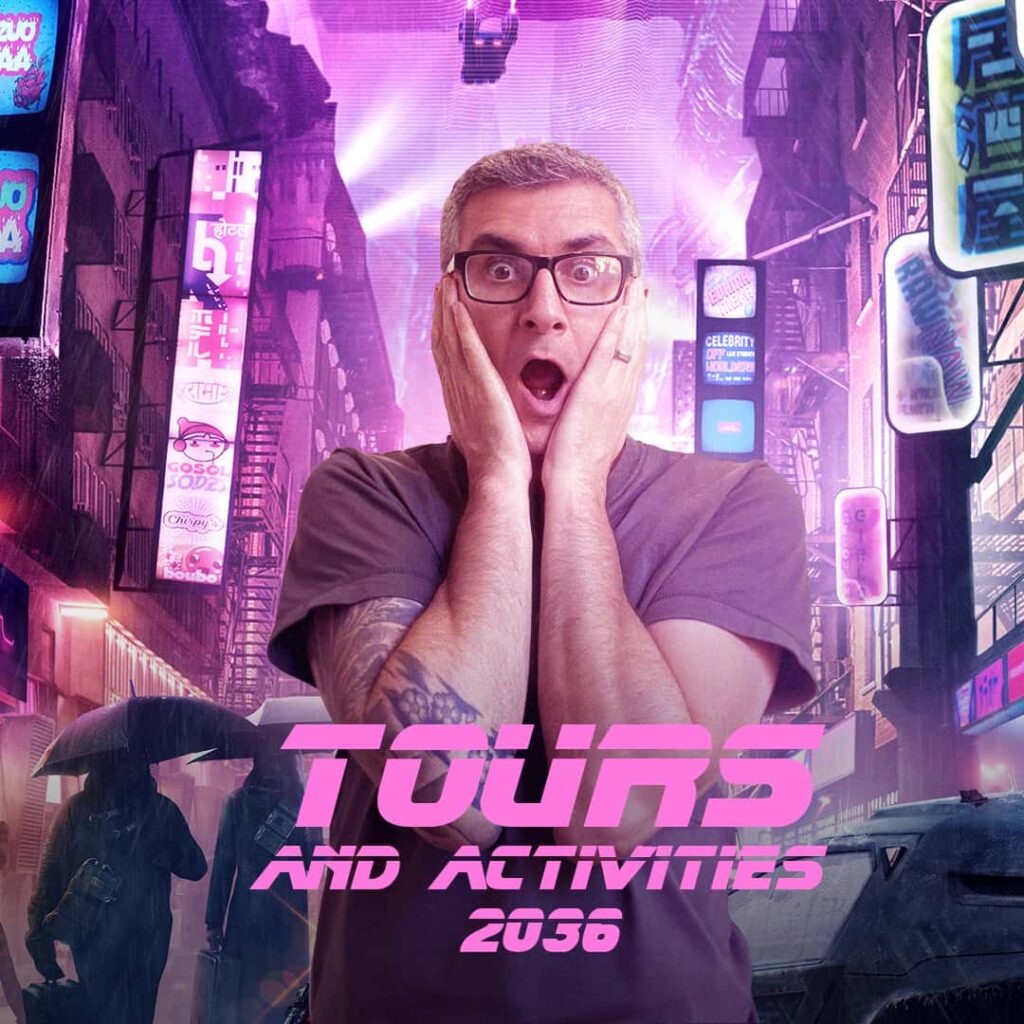With everything that has gone on in the travel and tourism industry over the last few years, it is safe to say that technology has accelerated 5-10 years ahead of where we would have been if Covid did not happen.
Virtual tours, artificial Intelligence, autonomous vehicles, how we accept cash, how we travel… it has all changed. And these changes are happening at such an alarming rate that opportunities may pass you by before you realise your competitors have had a head start.
Although this opinion piece is somewhat speculation, it is an educated guess on what we see happening today in and around our industry. It is to help you better understand what may be around the corner for tours and activities so you can at least look into the various aspects and ascertain how it will affect your tourism business.

The Rise of Artificial Intelligence
Most tour operators I speak to either say “AI will never replace in-person tour guides” or “People will never go for them”. Personally, the latter is completely wrong, the first is completely right… but there will be a market for AI.
In-person tour guides will always be the most desired and will become the premium tourism experience. Tour operators will be able to charge that little bit more for a more personalised experience. An AI tour guide option, on the other hand, will help generate extra revenue as you conduct the in-person tours.
Just like audio tours — which were equally dismissed when they first arrived — AI guided tours will allow you to reach a much wider audience. Imagine being able to deliver that experience in multiple languages without you ever speaking a word or having to learn 15+ languages. It allows you to be in many places at the same time, generating a passive income.
Although still in its infancy, AI has come a long way. Take Descript as an example. I spent 30 minutes reading a bunch of random scripts so that this platform could learn my voice and mannerisms. I then uploaded the introduction to one of the tours on johnenglandtours.com. The results are simply incredible…
Although there are some issues with pronunciation and inflections, 90% of this is spot on and it does sound like me. Can you imagine this mixed with a Deep Fake of your own face?!? The technology is moving at such a fast pace that in 5 years time, let alone 15, reality will be indistinguishable.
Alex Bainbridge of Autoura, has been working on an AI delivered experience called Sahra, that aims to provide a platform for this type of experience. Alex experimented with an AI generated ‘human’…
Again, although not perfect, it’s an incredible example of this early technology. Let me be clear: that is not a real person but a fully computer generated ‘human’.
I see this as an amazing opportunity for operators to generate extra revenue in a passive income model. Those who dismiss it are simply missing its potential.
The Death of Physical Cash
In many countries, we were already heading toward a cashless society, but this may have taken another 50 years or so. Because of Covid, I can see this happening within the next 10-15 years. I am already seeing many retail stores, hospitality venues and experience providers accept cards only; this has been expedited because of the pandemic. I very rarely carry cash, too. Between the pandemic and environmental issues we currently face (most ‘paper’ money is plastic!), I can see physical cash being phased out entirely.
Autonomous Vehicles Will Become Normal
Driverless, or autonomous, vehicles are here now and will only become more popular. These types of vehicles will become extremely popular within cities, but even within more remote villages and towns we will see the technology grow rapidly. Take a look at this video from China of a driverless vehicle travelling around a rather challenging environment…
In an area full of people cutting in front of the car and all the other environmental obstacles, the car performs arguably safer than a human being. An AI does not get frustrated or impatient, so is less likely to do something stupid.
From a tour and activity standpoint, imagine taking your customers around part of a tour to be dropped off with an in-person guide and then continue the journey with an AI guide with that same in-person tour guide’s voice…in many languages! These types of hybrid tours will open up new doors and revenue opportunities for tour operators.
No One Will Own a Car
From what I see within the industry, car manufacturers are building fewer and fewer cars each year. Between this and pressure from governments to switch to electric and wanting to create less waste, car manufacturers are looking at ways to generate revenue. This is when, I believe, most will turn to the Netflix concept and provide a subscription-based model.
In 15 years time, you may be in need of a car, so you will simply order one on your phone and one will turn up outside your home ready to use. This will have major positive implications for our lives and the environment. Imagine no need for on-street parking. Buildings can be more creative as they no longer need to leave space for vehicles near or at homes. Public transport will change and evolve as well.
Experiences will also change, with tour operators who normally have a fleet of buses or vehicles no longer required to hold stock or pay for storage of these vehicles. And that can mean more revenue in their pockets.
Flying Cars Will Make Their Way Into Tours and Experiences
Think this is science fiction? Think again…
Although this is still at the very early stages, I can already see flying car tours across the Grand Canyon or around New York to then land and drive to your next location. A lot of consumers would jump at the chance to pay for this type of experience, so watch for this form of transportation to start to take-off (pun intended).
Bus & Coach Tours Operators Will Need to Evolve
Bus and coach tours as we know them will cease to exist. Large coaches will not be allowed into cities, so smaller, electric vehicles will become more commonplace. This will cause a lot of issues for those sightseeing companies who have a large inventory of vehicles; not only will they have stock that they may not be able to use, most rely on the resale value of these vehicles. This will severely limit their future value and sellability, with the only options for resale possibly being less-developed destinations lacking the latest technological infrastructure.
These operators will need to adapt their fleets to accommodate smaller groups with more frequency. This, combined with what will be growing pressure from the subscription models I mentioned above will portray bus and coach tour operators to soon be seen as dinosaurs with more consumers opting for the more convenient option. We may even see competition from the likes of Amazon and Apple, who are also developing vehicles along this vein,
To me, this is the single most troubling sector within the tourism industry that I fear for the most, as I see little to no progression in this area.
International Travel Will Happen Less Often – But Be More Focused
Primarily because of climate change, we will travel internationally far less frequently, unless electric planes (already being developed) become more commonplace. I can foresee a complete shake-up of the travel industry with budget airlines no longer being ‘budget’ due to various multinational regulations. As consumers, we will most likely have just one main international travel break a year.
Business travel has changed forever, according to Gref Hayes, CEO of jet-engine maker Raytheon Technologies. Now, because of how technology has moved on, corporate travel will happen less often with businesses opting for more virtual meetings with one or two in-person meetings per year at most. Pre-pandemic, around 30% percent of normal commercial air traffic was corporate-related, with around half of this actually being mandatory.
Domestic Travel Will Continue to Soar
Because we will be travelling internationally less often, domestic tourism will soar as a byproduct. We have already seen domestic travel booming; Airbnb bookings and homegrown experiences in many parts of the world are being snapped up by fed-up consumers. This trend will not change any time soon as, and — it pains me to say this — travel will be in a state of flux for at least the next 10 years because of the pandemic.
Destinations will open and close for the foreseeable future, so it is an issue we will all have to live with. Travel will never go back to the way it was pre-pandemic. We are now living in a different world. While we are creating a more conscious society when it comes to our global footprint, it is still in our nature to explore… we will just do more of this closer to home.
The Tourism Industry Will See Lots of Consolidation
A lot of OTAs are losing eye-watering amounts of money per year to acquire customers, often at a loss. They are trying to capture that consumer into their ecosystem, but this cannot continue with the way the tourism industry has been altered. VC money will only get you so far, as I wrote regarding the effectiveness of OTA brand growth.
I can see the likes of Amazon, Apple or a car manufacturer acquiring an OTA to integrate into the new devices, experiences and the autonomous vehicles they are currently developing.
The pandemic has expedited the strategies of most of the OTAs, so expect some of the big names we see today — the Tripadvisors, the GetYourGuides, etc — no longer existing and their assets being stripped and combined into other players in the industry. The same can be said for reservation systems. I can see some of these well-known names combining forces and resources to push the industry towards a standard that the likes of hotels has built over the years.
Personalisation Will Be Key
Because of the technologies above, the level of personalisation will be the single most important factor when it comes to selling and experiencing a tour, activity or attraction.
Imagine taking a ride in an autonomous vehicle and the provider knows your favourite colour, the drink you would like waiting for you, the music to be played as the vehicle drives around a destination, and the perfect suggestions of places to eat because it knows your favourite food. All of this is happening and will only become more commonplace. As with all changes, some may be nervous and see this as an intrusion. I am the complete opposite. And I believe once consumers witness firsthand the convenience that it brings, they will never go back.
Again, these are my feelings but educated guesses on what I see happening around us today in the tours and activities sector.
What are your thoughts on all this? Good? Bad? Excited? Would love to know what you think.

